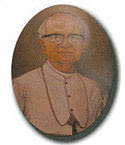During the elections of 1955 the Catholics were a proud number two after the four great parties: PNU, Masyumi, Nu and PKI: how one can be proud to be great!
P. 72 describes a humorous and mild but strong Kasimo rejecring cooperation with the Communists: Ha,ha,ha tidak setuju is he quoted to have said with a smile to Sukarno!
In the late 1960s the Catholic organizations united under the label of Front Katolik Tanpa Lobang.
pp 74-5 is a very open description of the difference between Djajasepoetra of jakarta and Soegijopranoto of Semarang, especially in the 1960s. The Front Katolik Tanpa Lobang seems to have been an initiative of Djajasepoetra in Jakarta that became most active after G-30-S and attended meetings where Harry Tjan Silalahi was an important member.
As if Seda finds an excuse, he mentions that 'the chairman of the Catholic Party [= Seda!] had not become a member of the cabinet in 1964 only became a minister after pressure from General Yani.
Twice Djajasepoetra who was archbishop of Jakarta 1953-1970.
Pp 76-7 has a nice reflection on three figures around Jesus: High Priest Anas, King Herod and Pontius Pilate. All three were hypocrite men, looking for power rather than the truth. Perhaps Pilate was the most honest or reasonable of the three, but in the end he also gave in when Anas threatened that he would be considered as no longer a friend of the emperor, if he would not sentence Jesus to death. A surprise amidst the political story.
Page 76 has an anecdote about Dawam Rahardjo who asked him why the Catholics could work so well together with the Muslims? "There was never a cabinet, led by Masyumi, where Catholics were not present. At the formation, Masyumi would first give a telephone call to the Catholics.There were also good relation with the NU in the period of Guided Democracy (in the front Pancasila)". Seda writesn that the catholics considered the Muslim parties as based on morality (beginselpartij) not opportunism, but based on principles. And there were good personal relations between the leaders.

Geen opmerkingen:
Een reactie posten